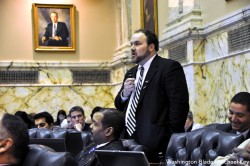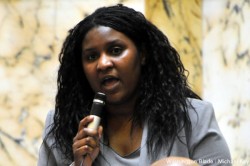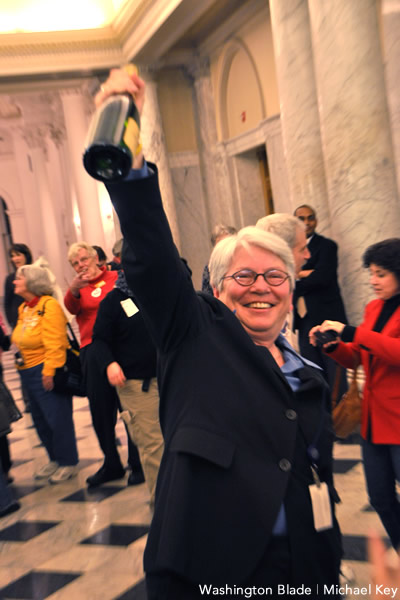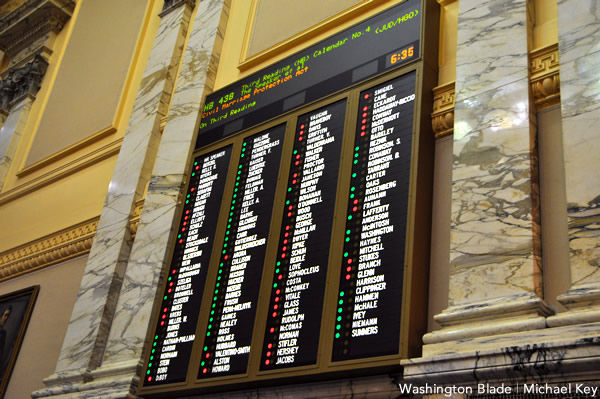Local
Marylanders celebrate as House OKs marriage bill
Intense floor debate leads to dramatic victory; referendum on horizon

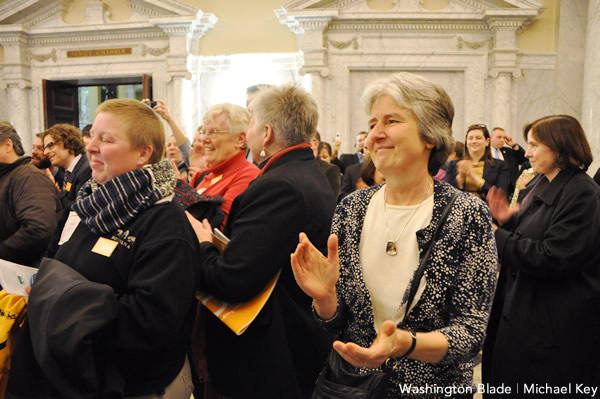
The crowd gathered at the Maryland Capitol cheered ecstatically when the marriage bill passed. (Washington Blade photo by Michael Key)
ANNAPOLIS, Md. — A jubilant crowd erupted into cheers outside the House of Delegates chambers Friday night, as news broke that lawmakers had approved the Civil Marriage Protection Act in a close 72-67 vote.
The dramatic outcome — the bill passed by two votes, triggering a raucous cheer in the chambers — followed an emotional debate over the measure that would extend marriage rights to same-sex couples in the Free State. The bill now goes to the Senate, which passed a similar measure last year, and is expected to vote on the bill in the coming weeks.
MORE PHOTOS AND COVERAGE OF THE DEBATE LEADING UP TO THE WIN FROM THE BLADE.
Gov. Martin O’Malley has made the bill a priority and testified in favor of it at a House committee hearing. Assuming the Senate passes it as expected and O’Malley signs as promised, opponents would have until May 31 to collect 55,736 valid signatures to qualify a measure for the November ballot that would strike down the law.
“I didn’t do anything, we all did it,” Del. Luke Clippinger (D-Baltimore) said after the historic vote. “And now we’re sending this bill to Sen. Madaleno in the Senate, and we believe we’ll get this bill passed, and get it to the governor’s desk, and he’ll sign it right away.”
“As a big baseball fan, I’m guessing this is what it feels like to win the World Series,” Del. Heather Mizeur (D-Takoma Park), a lesbian, told the Blade.
Clippinger became emotional as he rose to encourage his colleagues to support extending marriage rights to himself, the six other openly gay and lesbian delegates in the Maryland House, their colleague Sen. Richard Madaleno, and thousands of same-sex couples throughout Maryland.
“I ask you to vote ‘yes’ because the joy felt by two parents raising children shouldn’t be overshadowed by fear that the other parent might not be able to care for that child in a time of crisis,” Clippinger proclaimed to his fellow legislators. “But more, I’m here tonight to ask you to vote ‘yes,’ as I have before. Because I am here as a child of God, perfect in my imperfections. Because I am here — not less than any other person — but a full beneficiary to all of God’s infinite love, just as each and every person is. Because I am here as a Marylander.”
The final floor speech before the close vote was delivered by Del. Tiffany Alston, who angered many LGBT advocates in 2011 when she pulled her support for the bill. Alston spoke to the delegates about the difficulty she had coming to her decision to once again support gender neutral marriage in Maryland.
“I can say that my religion still tells me that marriage is between a man and a woman,” Alston said in a shaking voice, clearly emotional. “And I can tell you I still believe it’s OK for people of the same sex to get married. But what I know, is that as a state it’s time for us to move beyond this issue.”
“Today, I’m going to cast a green vote in support of the bill.” Alston adding, noting that she supports a referendum on the issue.
Upon her proclamation, many of the gay and lesbian lawmakers — including Clippinger, who had been a driving force behind the bill — became visibly emotional.
Alston offered one of two amendments that was accepted by the legislature earlier in the afternoon, which would ensure that the law could not take effect until all legal challenges to the law and any possible referendum were settled. However, according to the Maryland Constitution, a law cannot take effect until any referendum challenge has been settled in any case, meaning the Alston amendment merely restated existing state law.
Supporters of same-sex marriage were happy to back Alston’s amendment if it meant comfort to those lawmakers hesitant to support the bill before them because they feared a referendum would be blocked.
“It was something that could add a level of comfort for some people,” Del. Mary Washington (D-Baltimore), a lesbian, told the Blade, after the amendment was accepted 81-52. “This is something that we could negotiate on.”
Mizeur told the Blade that the fate of Alston’s vote on the bill itself was in the balance up to the afternoon of the vote. Throughout the proceedings, Alston seemed emotional, often resting her head in her hands as she sat at her desk, and looking around the room at her colleagues as they delivered their speeches for and against the bill.
“We talked about it as a possibility yesterday, and we were putting things in play to see if it would work,” Mizeur said. “By this morning, I was told 50/50, and we didn’t exactly know for sure when we were heading into the floor. It was that close.”
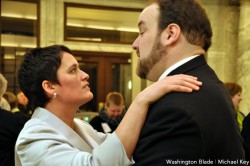
Dels. Heather Mizeur and Luke Clippinger embraced following the vote. (Washington Blade photo by Michael Key)
The bill’s supporters were grateful for Alston’s vote, as her change of heart in March 2011 elicited a backlash from many in the LGBT community.
Another amendment that the delegates passed was a measure that would have changed the date that the law went into effect from October to January.
A rejected amendment would have changed “civil marriage” to “civil unions,” in the law, a change that at least four of those who eventually voted against the bill said would have helped persuade them to support the measure, including former National Football League quarterback, Del. Jay Walker, who cited his fellow former NFL player, gay defensive tackle Esera Tuaolo in his remarks.
Another rejected amendment would have changed the legal age of consent for same-sex marriage to 18, and a fourth would have allowed parents to opt their children out of same-sex marriage related curriculum that they found offensive, which lesbian Del. Anne Kaiser argued the law already allows.
During the floor speeches Friday night, Del. Maggie McIntosh (D-Baltimore) gave a moving speech about making history in 2001 when she came out as a lesbian to her fellow lawmakers the same year that the House voted to enact a non-discrimination law covering gays and lesbians in employment.
“In 2001, I became legal,” McIntosh said of the vote, calling it a great moment in history.
Throughout the floor speeches, many of the opponents of the same-sex marriage bill began to move on from discussing the impending vote, to instead rallying for the expected ballot referendum, indicating that at least some of the opponents were expecting the bill to pass.
“It ain’t over ’til it’s over,” Del. Emmett Burns told the legislature, referring to the referendum, and insisting the voters must have their say. “The battle is not over. Same-sex marriage no!”
Many of the opponents referred to a legal fight over an immigration-related referendum that opponents attempted to block in Maryland. A judge has recently allowed that referendum to move forward. Referendum supporters wanted to be assured that there would be no impediments to giving Maryland voters an opportunity to overturn marriage, should it pass the Senate.
In contrast to the opposition, many LGBT allies in the legislature stood up to encourage their colleagues to do what they believed was right, with Baltimore Del. Keiffer Mitchell, Jr. calling LGBT rights “the civil rights issue of our generation.”
“I will not vote to deny individuals access to the same legal rights and responsibilities that are given to me and my wife by the state,” said Del. John A. Olszewski, Jr., who said he supported religious provisions that allow faith communities to make their own decisions about which marriages to peform. “As I think about one day when my wife and I look back on our time with our kids when they’re reaching [the marrying age], I know that they’ll be thankful, and I’ll be thankful for what I’ve done today.”
Feelings of relief
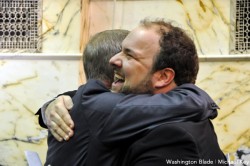
Gay Dels. Peter Murphy and Luke Clippinger embrace following the vote. (Washington Blade photo by Michael Key)
Bill co-sponsor Del. Nathaniel Oaks described a feeling of relief after the bill’s passage, and that sentiment was echoed by almost every other supporter.
“It’s like a big giant weight that’s been lifted, and now we move on,” Del. Mitchell told the Blade, calling the close vote “courageous.” “It’s great to be a part of this history.”
“Tonight can never be taken from us,” Del. Washington told the Blade after the vote.
Voting against the bill was Del. Sam Arora (D-Mont. Co.) who co-sponsored the failed bill of two years ago, and had in 2010 campaigned on a platform that he would support same-sex marriage.
“We feel betrayed,” said progressive activist Karl Frisch, who said that he supported his friend Sam Arora during his election, and said he speaks for many of Arora’s former friends. “This is about family and doing what’s right.”
Frisch told the Blade that a large group of national and local progressive leaders met via conference call Friday night to discuss replacing Del. Arora in his district with another Democrat.
“But it’s nothing personal, in the same way that Sam would claim it’s nothing personal, it’s just his faith,” Frisch said, telling the Blade that Arora took money from those he promised to support marriage equality. “It’s not personal, it’s just our lives. At the end of the day, I wonder how Sam squares his faith with lying and fraud.”
“I have a friend who bought a house in Maryland — not far from his district — and they regret not buying the house in his district so they would be able to vote against him in the next election,” Frisch said. “I hope he has trouble sleeping at night with the shame on his conscience.”
Another damper on last night’s celebrations was the looming prospect of referendum.
“We know there’s people probably out there right now with their petitions gathering signatures,” said Lisa Polyak, chair of the Equality Maryland board of directors. “We have a strategy that we’ve already been working on for months now about how we’re going to 50 plus 1, but we’ll worry about that tomorrow. Tonight we’re going to celebrate.”
Supporters jubilant, eyes on referendum
On the subject of a referendum threat, Clippinger said he is confident that same-sex couples in Maryland will see victory there too.
“We are going to win. The only people that are going to keep us from winning are those who doubt that we can.”
“Today, the House of Delegates voted for human dignity,” Gov. Martin O’Malley said in a statement. “Speaker Busch and his fellow delegates deserve a lot of credit for their hard work. At its heart, their vote was a vote for Maryland’s children.”
He continued, “There is still work to be done and marriage equality has not yet been achieved in Maryland. Wherever we happen to stand on the marriage equality issue, we can agree that all our children deserve the opportunity to live in a loving, caring, committed, and stable home, protected equally under the law.”
“We could not be more grateful to the delegates who today voted to make all Maryland families stronger,” said Joe Solmonese, president of the Human Rights Campaign. “Today, we took a giant step toward marriage equality becoming law – and we are in this position due to the unwavering leadership and resolve of Governor O’Malley, Speaker Busch and our legislative allies.”
Dana Beyer, Gender Rights Maryland executive director, cheered the victory for gay and lesbian Marylanders, telling the Blade she felt “joy.”
“It changes the culture,” Beyer told the Blade. “That’s probably the most important thing. Now we have to do the heavy lifting and deal with the referendum, and that’s why I’m here to do that, and hopefully to get the gender identity bill through, now that this is off the table, so that we can have a duopoly this year.”
Virginia
EXCLUSIVE: HRC PAC to endorse Spanberger for Va. governor
Former congresswoman to face off against state’s GOP lieutenant governor
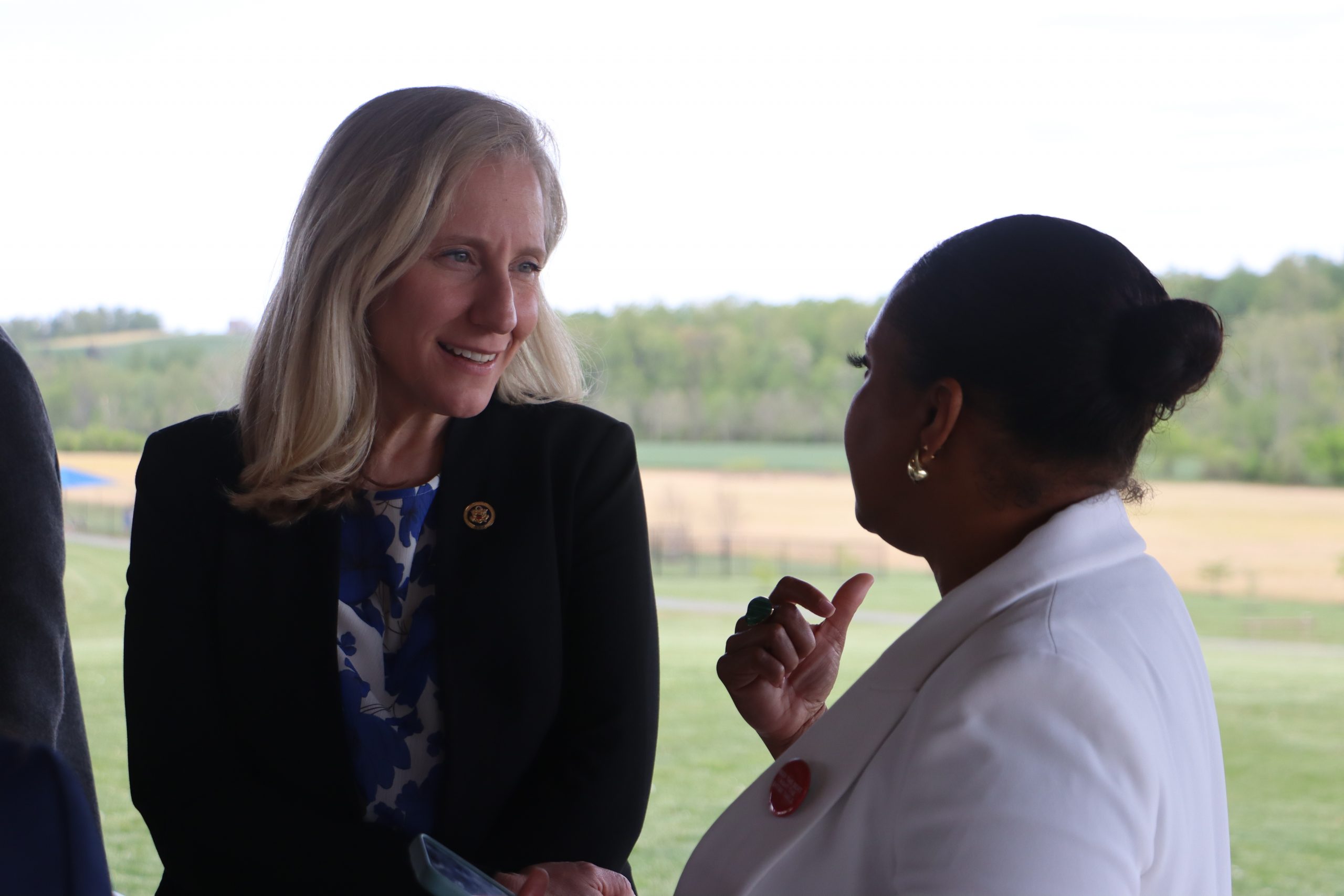
The Human Rights Campaign PAC on Tuesday will endorse Democratic nominee Abigail Spanberger’s run for governor of Virginia, the organization told the Washington Blade.
The former CIA agent-turned-congresswoman, who represented her state’s 7th Congressional District from 2019 to 2025, will face off against Republican Lieutenant Gov. Winsome Earle-Sears in this year’s gubernatorial race.
A Roanoke College survey in February found Spanberger in the lead with a comfortable margin, 39-24, while a trio of polls in January found her ahead by one, five, and 10 percentage points.
Virginia’s incumbent Republican Gov. Glenn Youngkin, who is prohibited from seeking a second term under the state’s constitution, has consistently restricted LGBTQ rights and attacked the transgender community since taking office in 2022.
HRC said Spanberger’s candidacy “offers Virginians renewed hope for a future rooted in equality,” with the group’s president, Kelley Robinson, calling her “a champion for the LGBTQ community.”
Noting the former congresswoman’s co-sponsorship of the Equality Act, legislation that would expand federal anti-discrimination protections to include LGBTQ people, Robinson said Spanberger “understands that Virginia’s future success depends on the full inclusion and protection of all its people.”
HRC’s president added, “As governor, she will work tirelessly to build a Virginia where everyone — regardless of who they are or who they love — can live, work, and go to school with dignity, safety, and opportunity. We are thrilled to support her and mobilize pro-equality Virginians to make her the commonwealth’s next governor.”
Responding to news of the endorsement, Spanberger said “I’m honored to earn the endorsement of the Human Rights Campaign, and I’m ready to work together to build on the progress we’ve made to secure equal protections for all Virginians under the law.”
“Affirming that Virginia is a welcoming home for all families goes beyond protecting marriage equality — it means defending Virginians’ right to live without fear of discrimination or harm,” she said. “As governor, I will work to make sure that no Virginian is denied government services, loses a job, or faces any other form of discrimination because of who they love or who they are.”
HRC further noted that Spanberger fought to pass the Respect for Marriage Act, which was signed into law in 2022 and codified legal protections for married same-sex and interracial couples, as well as her promise to “defend marriage equality and work with the General Assembly to enshrine marriage equality in Virginia’s constitution.”
Spanberger has also committed to “signing legislation guaranteeing Virginians’ right to access contraception and birth control,” HRC wrote, “and protecting against attempts by extreme judges and politicians to roll back Virginians’ reproductive freedoms.”
By contrast, the organization criticized Sears’s LGBTQ rights record — noting that in 2004, she pledged to “emphatically support a constitutional amendment” banning same-sex marriage, in 2021, she campaigned with a gubernatorial candidate who said homosexuality was the “work of the devil,” and in 2022, she “dodged questions” about her position on marriage equality and “attempted to rewrite her hateful history.”
Since 1977, with only one exception, Virginia has elected governors who belong to the party that is out of power at the presidential level. The state’s upcoming off-year gubernatorial contest presents an opportunity for Democrats who are eager for a major electoral victory to channel momentum against President Donald Trump and Republican majorities in Congress.
District of Columbia
Gay Men’s Chorus of Washington to celebrate Spring Affair honorees
‘Their work inspires our music and deepens our mission’

For 44 years, the Gay Men’s Chorus of Washington (GMCW) has served as a powerful voice for love, unity, and pride among Washington’s LGBTQ community and its allies. Since its first performance in 1981—at the opening of the National Gay Task Force’s Washington office (later becoming the National LGBTQ Task Force)—GMCW has built a politically engaged and culturally significant legacy as one of the nation’s foremost LGBTQ performing arts organizations.
As its music and mission evolved, GMCW deepened its involvement in supporting LGBTQ individuals and allies alike. In 2004, the chorus launched its first Spring Affair fundraiser. This annual event not only generates financial support for the inclusive choral group, but also honors individuals and organizations in the Washington community who exemplify GMCW’s mission of unity, equity, and empowerment through music.
Each year at the Spring Affair gala, the chorus honors one community leader, one external organization, and one GMCW member. For the 2025 gala, GMCW will recognize Bishop Mariann Edgar Budde, Atlas Performing Arts Center, and GMCW member Keygan Miller.
“These honorees remind us why we sing,” said Thea Kano, artistic director of the Gay Men’s Chorus of Washington, DC, in an email. “In moments when our community has needed strength, they’ve offered hope. Whether it’s a brave voice from the pulpit, a tireless advocate for our youth, or an organization that opens its doors to every story—each has chosen to lead with love, truth, and courage. Their work inspires our music and deepens our mission.”
GMCW will honor Bishop Mariann Edgar Budde, the first woman elected to lead the Episcopal Diocese of Washington, as its 2025 individual award recipient. A longtime champion of equity and inclusion, Bishop Budde gained national prominence during the Inaugural Prayer Service at Washington National Cathedral, where she spoke directly to newly sworn-in President Donald Trump.
“Have mercy, Mr. President,” she implored, lifting the hopes of the most vulnerable Americans targeted by Trump’s policies—particularly LGBTQ and immigrant communities. Her bold words signaled to the nation that she remains a genuine and outspoken voice for justice, unity, and truth, inspiring compassion and faith within and beyond her religious community.
GMCW will present the Harmony Award for an Organization to the Atlas Performing Arts Center, located in the historic H Street, N.E. corridor. In 2024 alone, Atlas hosted more than 400 events and provided $1.6 million in free and discounted tickets, arts education, community programming, and space use. Through this work, Atlas has amplified “artistic voices that reflect the full diversity of our community.”
The center has long partnered with GMCW, offering space for open mic nights, cabarets, GenOUT Chorus events like the Youth Summit, and even memorial services such as that for Bobby T. Boaz. Atlas exemplifies GMCW’s mission of storytelling, equity, and civic connection through programs like the INTERSECTIONS Festival and City at Peace.
“We are absolutely thrilled and deeply honored that the Atlas Performing Arts Center has been named a recipient of the GMCW Harmony Award! This recognition is a powerful affirmation of our commitment to uplifting voices, fostering inclusive creative expression, and building a space where everyone feels seen, heard, and celebrated,” said Jarrod Bennett, Executive Director of the Atlas Performing Arts Center.
“At the Atlas, our mission is rooted in the belief that the arts are for everyone—and that through performance, dialogue, and community, we can help shape a more just, compassionate world. To be acknowledged by the Gay Men’s Chorus of Washington, DC—an organization that has long stood at the forefront of championing equality and advancing the well-being of the LGBTQ+ community—is a profound and humbling honor. We continue to be inspired by GMCW’s work and are proud to stand alongside them in this shared vision. Thank you, GMCW, for this beautiful recognition. We carry it forward with gratitude and renewed energy for the work ahead.”
Finally, GMCW will honor Keygan Miller, a chorus member since 2017, for their leadership, advocacy, and commitment to equity both onstage and off. Within GMCW, Miller served as Vice President of Diversity and Inclusion, led conversations to expand trans inclusion, authored the “Day One” pledge, and played a critical role in shaping inclusive programming.
Outside the chorus, Miller serves as Director of Public Training for The Trevor Project, a national nonprofit focused on crisis intervention and suicide prevention services for LGBTQ youth under 25. They previously worked as an Advocacy Manager at the Trevor Project, where they championed policies protecting LGBTQ+ youth at every level of government.
As GMCW continues its mission to uplift and unite through music, the organization encourages new voices to join its ranks. GMCW welcomes all singers—regardless of gender identity or sexual orientation—who can sing in the lower vocal registers.
The 2025 Spring Affair Gala will take place on May 17, 2025, at The Ritz-Carlton, Washington, D.C. This annual benefit supports GMCW’s artistic and educational programming. For tickets, audition information, and more, visit GMCW.org.
District of Columbia
Activists stage reenactment of 1965 gay rights protest at White House
Event marked 60th anniversary of historic picketing

With dozens of tourists watching, a little over two dozen LGBTQ activists walked in a circular picket line carrying “homosexual rights” signs on the sidewalk in front of the White House on April 17 in a reenactment of the historic 1965 first gay rights protest outside the White House.
Organized by D.C.’s Rainbow History Project, the event marked the 60th anniversary of the 1965 protest, which was organized by gay rights pioneers Frank Kameny and Lilli Vincenz on behalf of the Mattachine Society of Washington, one of D.C.’s first gay rights groups that Kameny co-founded in the early 1960s.
“The White House picket is the origin story for public demonstrations for gay rights in the U.S., and the origin story for Pride marches and the annual LGBTQ Pride celebrations which occur across the globe,” according to a leaflet prepared by Rainbow History Project that participants in the reenactment handed out to passersby and tourists.
Among those participating in the reenactment protest was longtime D.C. LGBTQ rights advocate Paul Kuntzler, who is the last known survivor of the 1965 White House gay rights protest. Kuntzler carried a replica of the sign he said he carried at the 1965 protest, which states, “Fifteen Million U.S. Homosexuals Protest Federal Treatment.”

Other signs carried by participants stated, “Homosexuals Died for Their Country, Too;” “White House Refuses Replies To Our Letters – Afraid Of Us?”; “Cuba’s Government Persecutes Homosexuals, U.S. Government Beats Them To It;” “Homosexuals are American Citizens, Too.”
The leaflet that participants distributed at the April 17 reenactment, which includes a photo of the 1965 event, lists what it says were the four main demands issued by the Mattachine Society of Washington in 1965.
They called for an end to “the exclusion of homosexuals from federal employment,” an end to the ban on gays from serving in the U.S. military, an end to the “blanket denial of security clearances for gay people,” and an end to the government’s refusal to meet with the LGBTQ community or to reply to their letters.
The leaflet includes an excerpt from a letter that Kameny wrote to then-President Lyndon B. Johnson around the time of the 1965 protest.
“We ask you, Mr. President, for what all American citizens – singly and collectively – have the right to ask,” the letter states. “That our problems be given fair, unbiased consideration…consideration in which we, ourselves, are allowed to participate actively and are invited to do so.”
The leaflet notes that although Kameny died in 2011 and Vincenz died in 2023, “their legacy is carried on by modern LGBTQ+ rights activists, who continue to advocate for employment opportunities, legal protections, inclusive health services, and more.”
Rainbow History Project official Vincent Slatt, one of the lead organizers of the reenactment protest, said his group had no trouble obtaining a permit from the National Park Service to hold the event outside the White House.
“I think the picket is going very, very well today,” he said while watching the picketers on the White House sidewalk. “We have a couple of dozen people participating. And there are lots of tourists engaging,” he said. “We’re handing out pamphlets to let them know about the historic picket and the importance of learning LGBT history.”
Slatt added, “But the highest impact is really that the media showed up to spread awareness of this.”
Lesbian activist Leticia Gomez, while walking on the White House picket line at the reenactment event, said she was among those who benefited from the 1965 protest and those that followed in support of LGBTQ rights.
“I’m blessed,” she said. “I got to work 34 years for the federal government as an out lesbian in the Department of the Navy,” she told the Blade. “So, because of what they did and all the other protests that came after that, it allowed me to have the career that I had.”
Also walking the picket line at the April 17 reenactment event was Deacon Maccubbin, owner of the former D.C. LGBTQ bookstore Lambda Rising and organizer of D.C.’s first Gay Pride Day event in 1975.
“It was really wonderful to be here today after 60 years,” he said. “I wasn’t at the first one,” he told the Blade. “But it’s just wonderful that this happened in 1965. It started the ball rolling, and all the progress that we’ve made, the fact that we do gay Pride every year in D.C. – all of those are dependent on this demonstration that got started in 1965.”
-

 State Department5 days ago
State Department5 days agoHIV/AIDS activists protest at State Department, demand full PEPFAR funding restoration
-

 District of Columbia5 days ago
District of Columbia5 days agoCapital Pride wins $900,000 D.C. grant to support WorldPride
-

 Obituary4 days ago
Obituary4 days agoLocal attorney, LGBTQ rights advocate Dale Sanders dies at 75
-

 U.S. Federal Courts3 days ago
U.S. Federal Courts3 days agoFederal judge blocks Trump passport executive order

